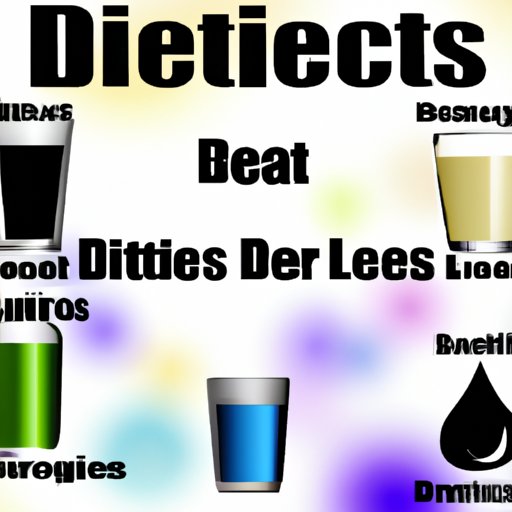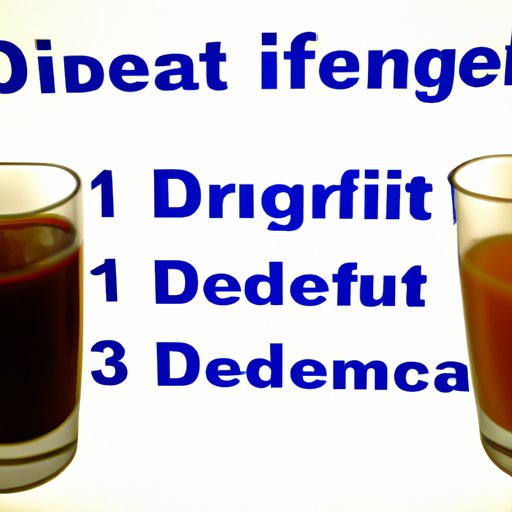Introduction: Overview of Liquid Diets
Liquid diets have been around for centuries, but they have become increasingly popular in recent years. A liquid diet is a type of diet where all or most of the food consumed is in liquid form. This can include juices, smoothies, soups, shakes, herbal teas, and other beverages. People often turn to liquid diets when they want to lose weight quickly or detox their bodies.
The purpose of this article is to explore the pros and cons of liquid diets, as well as the health benefits and risks associated with them. We will also compare liquid diets to other forms of dieting, and provide a cost-benefit analysis of liquid diets. By the end of this article, you should have a better understanding of whether liquid diets are right for you.

Pros and Cons of Liquid Diets
When it comes to liquid diets, there are both pros and cons that you should consider. Let’s take a look at some of the advantages and disadvantages of liquid diets.
Benefits
One of the main benefits of liquid diets is that they can be very effective for weight loss. Since liquids tend to be less filling than solid foods, people who follow liquid diets are likely to consume fewer calories, leading to weight loss. Additionally, since liquid diets eliminate many unhealthy processed foods, they can help improve overall health.
Another benefit of liquid diets is that they can be much easier to stick to than other types of diets. Since liquid diets are often accompanied by meal plans and recipes, it can be much simpler to follow them than other diets. Furthermore, liquid diets can be tailored to individual needs and preferences, making them more accessible for a wider range of people.
Drawbacks
While liquid diets can be beneficial, there are also some drawbacks to consider. One of the biggest drawbacks is that liquid diets can be difficult to maintain long-term. Since they involve cutting out entire food groups, it can be hard to stick to these diets over time. Additionally, liquid diets can be expensive, as they often require purchasing special ingredients or supplements.
Another downside of liquid diets is that they can be lacking in essential nutrients. Since many liquid diets focus on eliminating certain types of food, it can be difficult to get the vitamins and minerals your body needs. Additionally, liquid diets don’t teach you how to incorporate healthy eating habits into your daily life, which can make it difficult to maintain your weight loss in the long run.
Popular Types of Liquid Diets
There are several different types of liquid diets that people use for weight loss or detoxification. Let’s take a look at some of the most popular types of liquid diets.
Juicing
Juicing is one of the most popular types of liquid diets. It involves extracting the juice from fruits and vegetables and drinking it as a beverage. Juicing can be beneficial because it allows you to consume a wide variety of vitamins and minerals in a single drink. Additionally, juicing can be a great way to incorporate more fruits and vegetables into your diet.
Soup Diets
Soup diets are another type of liquid diet. These diets involve consuming only soups for a period of time, usually one to two weeks. Soup diets can be beneficial because they provide a wide variety of nutrients in a convenient form. Additionally, soups can be a great way to increase your intake of vegetables.
Protein Shakes
Protein shakes are another popular type of liquid diet. Protein shakes are usually made from protein powder and milk or water, and can be used as a meal replacement or snack. Protein shakes can be beneficial because they provide your body with essential macronutrients like protein, carbohydrates, and fats. Additionally, they can be a convenient source of nutrition on the go.
Meal Replacement Shakes
Meal replacement shakes are similar to protein shakes, but they are usually higher in calories and contain more nutrients. Meal replacement shakes can be beneficial because they provide your body with a balanced mix of macronutrients, as well as essential vitamins and minerals. Additionally, they can be a convenient way to get a full meal without having to cook.

Health Benefits and Risks of Liquid Diets
Although liquid diets can be beneficial for weight loss, there are also some health benefits and risks associated with them. Let’s take a look at some of the potential health benefits and risks of liquid diets.
Nutritional Value
The nutritional value of a liquid diet depends on what types of liquids are consumed. If a liquid diet consists of mostly juices and smoothies, then it can be a great source of vitamins, minerals, and antioxidants. However, if the liquid diet consists of mostly sugary drinks or processed shakes, then it may not provide the nutrients your body needs.
Potential Side Effects
Although liquid diets can be beneficial for weight loss, they can also cause some side effects. For example, some people may experience headaches, fatigue, or dizziness due to the lack of solid food. Additionally, some people may experience digestive issues such as constipation or diarrhea. If you experience any of these symptoms, it’s important to consult your doctor.
Long-Term Effects of a Liquid Diet
When it comes to the long-term effects of a liquid diet, it’s important to consider both the benefits and risks. Let’s take a look at some of the potential long-term effects of a liquid diet.
Weight Loss
The most obvious long-term effect of a liquid diet is weight loss. Since liquid diets involve consuming fewer calories than usual, they can lead to significant weight loss in a short period of time. Additionally, the weight loss achieved through liquid diets is often maintained long-term, as long as healthy eating habits are adopted after the diet is finished.
Maintenance
In order to maintain the weight loss achieved through a liquid diet, it’s important to adopt healthy eating habits. This includes eating a balanced diet of whole foods, limiting processed foods, and getting regular physical activity. Additionally, it’s important to drink plenty of water and get enough sleep to ensure that your body is functioning properly.

Comparing Liquid Diets to Other Forms of Dieting
When it comes to losing weight, there are many different types of diets available. To get a better understanding of liquid diets, let’s compare them to two other popular forms of dieting: calorie restriction and low-carb diets.
Calorie Restriction
Calorie restriction is a diet that involves reducing your calorie intake to a specific level. The goal of calorie restriction is to reduce your overall calorie intake, leading to weight loss. While calorie restriction can be effective for weight loss, it can also be difficult to maintain long-term. Additionally, calorie restriction can lead to nutrient deficiencies if it is not done properly.
Low-Carb Diets
Low-carb diets are a type of diet that involves limiting your intake of carbohydrates. The goal of low-carb diets is to reduce your overall carbohydrate intake, leading to weight loss. Low-carb diets can be beneficial because they can help reduce cravings and stabilize blood sugar levels. However, they can also be difficult to maintain long-term, as they often involve cutting out entire food groups.
Cost-Benefit Analysis of Liquid Diets
When it comes to deciding whether a liquid diet is right for you, it’s important to consider the financial costs and health benefits associated with it. Let’s take a look at some of the potential costs and benefits of liquid diets.
Financial Costs
One of the main drawbacks of liquid diets is the financial cost associated with them. Since liquid diets often involve purchasing special ingredients or supplements, they can be quite expensive. Additionally, since liquid diets involve eliminating entire food groups, they can be difficult to maintain long-term, which can add up financially.
Health Benefits
Despite the financial costs, there are also some health benefits associated with liquid diets. Liquid diets can be beneficial for weight loss, as they involve consuming fewer calories than usual. Additionally, liquid diets can be helpful for detoxifying the body and improving overall health. Finally, liquid diets can be beneficial for those with food allergies or sensitivities, as they allow them to avoid certain foods.
Conclusion: Summary and Recommendations
In conclusion, liquid diets can be beneficial for weight loss and overall health. However, there are some drawbacks to consider, such as the financial cost and potential side effects. When it comes to deciding whether a liquid diet is right for you, it’s important to weigh the pros and cons and consider your individual needs and goals. Additionally, it’s important to remember that a healthy lifestyle involves more than just dieting; it also involves getting regular physical activity and adopting healthy eating habits.
If you decide to try a liquid diet, it’s important to consult your doctor first to ensure that it is safe for you. Additionally, it’s important to make sure that you are getting the necessary nutrients and calories your body needs. Finally, it’s important to remember that liquid diets are not a magic solution; they must be combined with healthy habits in order to be effective.
(Note: Is this article not meeting your expectations? Do you have knowledge or insights to share? Unlock new opportunities and expand your reach by joining our authors team. Click Registration to join us and share your expertise with our readers.)
